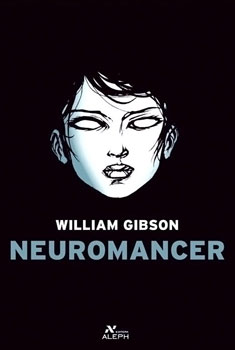I first read "Neuromancer" a long, long time ago and remembered nothing of the intricate plot. So now I get to read it again (after a romp through Walter Jon Williams' "Hardwired") and I guess it's the difference between gold and bronze. Gibson is original, edgy and writes scintillating text; Williams is solid, workmanlike and highly-derivative.
Here's what SF Reviews.net had to say about "Neuromancer" (excerpted) in 2007.
"That its protagonist, Case, is described as a console "cowboy" is no coincidence. Gibson is working within well-worn tropes here. Case is the classic thousand-faced hero, the loner of a million westerns who doesn't come looking for trouble even though trouble has a knack for finding him. His story, in turn, is the Hero's Journey dressed out in techno-chic. Over 20 years later, yes, Neuromancer's capacity to totally blow you away, dude, has dimmed somewhat. It is still an entertaining story to read, and one can see how Gibson's approach certainly had what it took to awaken a fairly stodgy genre from whatever publishing torpor it was in at the time.Can't agree with the reviewer that its lustre has dimmed: still blew me away, dude. The visuospatial model (here called "the Matrix" - yep, somewhat like the film) is not the current metaphor for the Internet .. but as VR improves it could be.
...
"Gibson didn't invent a whole lot in Neuromancer, but his masterstroke was in the delivery. Gibson simply turned everything up to "11". The seedy, run-down landscape of the Sprawl has already become the most overused cliché in SF since warp drive. But at the time, thanks to both this book and Blade Runner, it was gloriously new and a welcome riposte to the spotless and squeaky-clean steel and glass futures, inhabited by people who apparently never so much as shed skin cells, presented in media SF like Star Trek. (During our interview, Gibson mentioned going to see Blade Runner while working on Neuromancer's early drafts and coming very close to binning the book as a result, fearing accusations of ripoffery.)
"Gibson also knew that pacing was key. The story has a forward momentum that, at least in the early chapters, allows for no indulgent digressions. Finally, Gibson's language sparkled with moments of sheer visual poetry, adding a texture to the story that made his information-age future all the more real. We'd never really had an SF author talk about "the music of the street" before, or allow us the visualization of the inner workings of a computer matrix as literal landscapes in the way Gibson did. In even the most ruthless techno-future, Gibson found the artistry within the circuitry."
As someone who has dabbled in computer and network security for a living, I kept trying to bridge between malware/security-system interaction today and Gibson's physical-biological vision (ICE and sharks and dark 'n' dangerous blobby clouds and leech-like phages). Yep, it could go that way, you know.
The prequel is the short-story collection "Burning Chrome" and the next volume is "Count Zero" (the trilogy completes with "Mona Lisa Overdrive").
And Molly? I can see why he'd be attracted to her.
